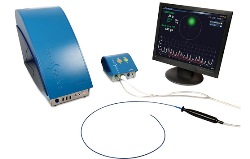May 14 2010
The Swiss medical company Endosense has enrolled its initial patients for its first study the EFFICAS 1 of its EFICAS series.
 Endosense Ablation Catheters with fiber optics sensor technology
Endosense Ablation Catheters with fiber optics sensor technology
The patients were registered in Prague, Czech Republic-based Na Homolce Hospital while Vivek Reddy, MD and Petr Neuzil, MD are treating these patients.
The EFFICAS study series will show that the utilization of contact force control while performing cardiac ablation with Endosense’s TactiCath force sensing type of catheter offers better outcomes in comparisons to ablations done without a force sensor.
Both EFICAS I and EFFICAS II are multi center, single arm pilot studies that evaluate the catheter ablation’s effectiveness without and with contact force control usage. Physicians will carry out the process using the TactiCath without accessing the contact force measurements during EFFICAS I. However, this stage will record the applied control forces.
Physicians will exercise the full benefit of the features of TactiCath contact force control in EFFICAS II, along with its capability for objectively influencing the ablation technique while lesion creation is being done. The occurrence of recondition regions in pulmonary vein isolation (PVI) lines with respect to the applied contact forces will be EFFICAS I’s endpoint, while the EFFICAS IIs endpoint will include reduced PVI reconduction when compared with EFFICAS I.
The design of larger, future EFFICAS studies along with clinical endpoints will be helped by the EFFICAS I and II’s outcomes. The TactiSys system and the TactiCath force sensing type of ablation catheter have been indicated for treating supraventricular tachycardia (SVT) and atrial fibrillation (AF). The TactiCath is currently unavailable in the US. TactiCath’s exclusive distributor for the Middle East, Africa, Europe, Canada and Latin America is BIOTRONIK.
St. Georg, Hamburg-based Asklepios Klinik’s MD Karl-Heinz Kuck informed that the EFFICAS studies depicts a thoughtful and rigorous approach of analyzing the contact force control’s comparative clinical effectiveness during the cardiac arrhythmias’ catheter ablation treatment. He added that EFFICAS I and II will be an important base for achieving this goal and will provide useful incremental insights for immediate application to existing practice.